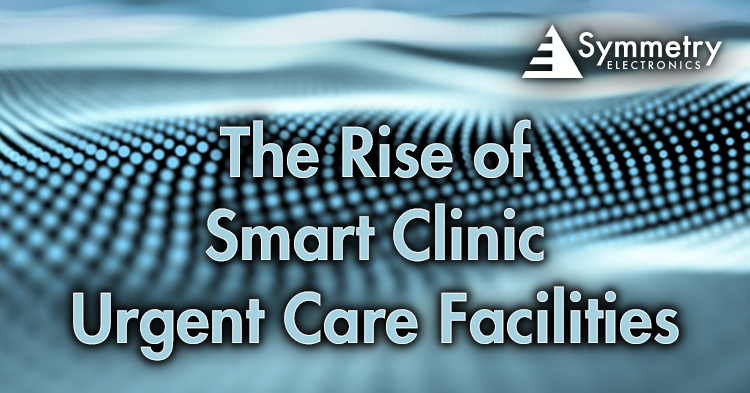- Home
- Symmetry Blog
- The Rise of Smart Clinic Urgent Care Facilities
The Rise of Smart Clinic Urgent Care Facilities
About Jari Haiston
.png)
With Industry 4.0 hitting the healthcare sector hard, innovation knows no bounds. One innovation gaining popularity is the emergence of smart clinic urgent care facilities. These facilities, leveraging the latest intelligent technologies in AI, robotics, and more are transforming the way patients receive care. In contrast to traditional urgent care centers, smart clinic urgent cares offer a comprehensive approach to healthcare delivery, integrating advanced technology with personalized care. Smart clinic urgent care facilities not only improve outcomes but also prioritize the protection of care providers and clinic employees.
What is a Smart Clinic?
Smart clinic technology represents a significant shift in how people receive routine care and procedures. Smart clinics utilize the latest technological advancements to optimize patient care and streamline processes. The integration of smart tech in healthcare facilities encompasses a wide range of services and specialties like comprehensive addiction treatment facilities and psychiatric services to musculoskeletal diagnostics and occupational health.
In fact, according to Grand View Research, the global smart healthcare market was estimated at $144.9 billion in 2022 and is expected to grow at a steady CAGR of 12.8% from 2023-2028. The secure adoption rate of intelligent tech in the healthcare sector can be attributed to several factors, including increased demand for efficient healthcare solutions, rising prevalence of chronic diseases, and the growing emphasis on patient-centric care.
Smart Technologies Used in Intelligent Healthcare Settings
The backbone of smart clinics lies in the intelligent technology they employ. Additionally, the Internet of Medical Things (IoMT) is instrumental in smart clinic settings, integrating interconnected medical devices and sensors to collect and transmit patient data in real-time. These devices can range from wearable health trackers to remote monitoring systems, enhancing the efficiency and effectiveness of patient care while enabling proactive interventions and personalized treatment plans. Some of the main intelligent technologies used in smart healthcare settings include:
- Artificial Intelligence (AI) helps analyze large amounts of data, such as medical records, images, and genomics to provide enhanced insight, diagnosis, treatment, and prevention of diseases.
- Robotics can assist in performing complex procedures, delivering medications, disinfecting rooms, and providing social and emotional support to patients.
- Precision medicine can customize treatments to individual patients based on their genetic, environmental, and lifestyle factors.
- 3D printing creates custom medical devices, implants, prosthetics, and organs at reduced costs and wait times.
- Immersive technologies like augmented reality (AR) and virtual reality (VR) can enhance medical evaluation, education, training, simulation, as well as provide immersive therapies and rehabilitation for patients.
- Telemedicine and telehealth enhance patient care, improve accessibility, and streamline delivery in healthcare settings.
- Wearable devices track vital signs, activity levels, and other health indicators to provide real-time data, feedback, and alerts to patients and providers.
- Remote monitoring uses sensors, cameras, and other devices to collect and transmit data from patients’ home or workplaces to enable early intervention, complication prevention, and more.



Using Smart Tech to Improve Patient Care
The incorporation of smart technologies in urgent care settings revolutionizes faster patient care in multifaceted ways. These technologies enable faster diagnostics, personalized treatment plans, remote consultations, and seamless communication between patients and providers.
Consequently, patients experience shorter wait times, improved health outcomes, increased satisfaction with their healthcare experience, and providers can work in a safer environment, minimizing exposure to risks and other hazards.
Obstacles Facing Smart Clinics
Despite the promise they hold, smart clinics encounter various obstacles on their journey to widespread adoption. High costs, regulatory hurdles, ethical dilemmas, technical glitches, cybersecurity risks, and resistance to change are among the challenges faced. Privacy breaches, data misuse, and malpractice concerns further compound these obstacles, necessitating careful navigation and robust solutions.
Developing a Smart Healthcare Solution at Symmetry Electronics
At Symmetry Electronics, we are committed to driving innovation through smart solutions. Our featured products encompass a wide range of cutting-edge components that can assist developers in designing the latest smart healthcare solutions from AI-powered diagnostics to wearable health trackers.
Laird Connectivity’s Lyra 24 series is an ideal solution for developers designing the latest smart medical peripherals. Integrating Silicon Labs’ ERF32BG24, Lyra 24 products offer flexibility and enhanced security features including Secure Boot, ARM® TrustZone®, and Hardware Cryptographic Acceleration to ensure your medical device facilitates the highest level of industry security.
Digi ConnectCore® 93 from Digi International is an embedded SoM based on the NXP® i.MX 93 application processor with AI and machine learning (ML) that enables globally connected products. ConnectCore 93 is ideal for longevity and scalability in medical, industrial, and energy and transportation applications.











